We would like to wish all our readers a very Happy Christmas and best wishes for 2022.
|
Our blog will now take its customary Christmas break and return on Monday the 24th of January 2022.
We would like to wish all our readers a very Happy Christmas and best wishes for 2022. by Declan Jordan I am seeking a graduate that is interested in undertaking a funded MSc by Research. This is a one year programme and the funding will cover fees and a small stipend.
Candidates are required to have a degree in a relevant discipline (e.g. Arts with Economics, Commerce, etc) and ideally be familiar with survey methods and data analysis. I am looking for someone to begin the project as soon as possible. The aim of the project is to explore the prevalence and extent of succession planning for volunteering in sports in Ireland. In addition, the research will provide insights on the experience of volunteers and clubs during the COVID pandemic and the effects of this on volunteer activity, motivation, and intentions to volunteer. The primary research questions are the extent to which volunteers perceive and clubs engage in structured processes of role transition and succession for volunteers and whether and how much volunteer motivation, workload, commitment, and intention been affected by the COVID pandemic. The project will gather original survey data from a representative sample of volunteers in sport and from club administrators. The project will involve working closely with a prominent Irish sporting organisation. If you are interested and/or would like more information please email Declan Jordan at d.jordan @ ucc.ie. By Robbie Butler Last week this blog looked at Covid cases in the English Premier League and the reoccurrence of the postponement of fixtures. While this may all seem inevitable, a closer look at the 3 other top European leagues in Spain, Germany and Italy demonstrate it does not have to be this way. The figure below presents data on the number of top flight fixtures scheduled and played on Saturday and Sunday, and vaccine uptake by players playing in the top flight of each of these leagues. The English Premier League has less than 70% of players double vaccinated. This compares poorly to the other three leagues, all of which exceed 90%. Is it any wonder then why no games were postponed in Europe, yet England's top division played less than half the scheduled fixtures?
Given the trajectory of the disease right now, it is difficult to see how this can improve in the short run. This will be a considerable blow to broadcasters of the league is suspended. Amazon Prime have just two allocated fixture dates all season, one of which is the 28th of December. What a blow this will be if the games are postponed. By John Considine 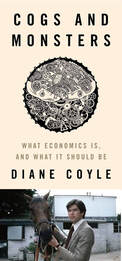 This week an Irish politician has proposed legislating to regulate the use of drones at Irish horseracing venues. According to media reports, the idea is to stop people with access to the footage from profiting on sports betting markets. It is the latest episode where individuals seek to profit by faster access to the market with their information. Just over two hundred years ago, the Rothschild family fortune was supplemented by their access to information about the outcome of the Battle of Waterloo. Legend has it that Nathan Rothschild tried to share his information with the UK Prime Minister but the PM was resting. He then proceeded to the Stock Exchange where he cashed in on his information. Rothschild’s advantage on the Stock Exchange was measured in days. Nowadays, advantage is measured milliseconds and nanoseconds. Diane Coyle says “New cables have been drilled through a corner of the Allegheny Mountains of Pennsylvania to bring Nasdaq’s serves in Carteret, New Jersey, a bit closer – three milliseconds to be exact – to photons originating in a data centre in Chicago’s South Loop. A new trans-Atlantic cable has reduced transmission times by 0.006 of a second, an improvement well worth the $300 million investment.” The improvement in communication technology is phenomenal. Almost 50 years ago, an infamous betting coup was made possible by the fact that there was only one telephone line to a UK racecourse. The Gay Future episode has since made it to the silver screen and the Courtroom. I have heard another story from around the same time. Two workmates noticed that the clock in the bookies was slow. Spotting a potential opportunity, they ran outside and rang the telephone kiosk at a venue where a race should have just finished. After hearing the name of the winner, our two racing enthusiasts returned to the bookies, gathered whatever coins they had in their pockets, and placed their bet. A very small fortune was made. However, the value of the story is priceless. It lingers in family circles and beyond. Technology is changing but the human motivation to make money, or to just to beat the system, is ageless. 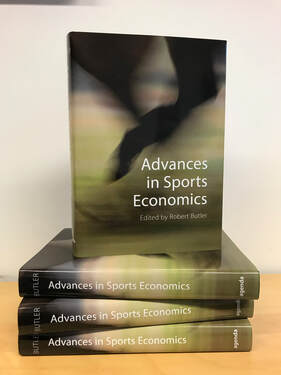 By Robbie Butler I am really pleased to let our readers know that Advances in Sports Economics is now available to buy in hardback from Agenda Publishing (Europe) here and Columbia University Press (USA) here. The collection of chapters examine a wide range of different sports, including baseball, basketball, cricket, football, horse racing, rugby, tennis and Gaelic games. The contributors consider economic issues such as incentives, rule changes, labour markets, competition structure, gambling, gender equality, match official behaviour, superstar players, funding and sports infrastructure, as well as interrogating the methods and theories used in sports economics. The essays showcase how the application of economic analysis can provide us with a better understanding of the mechanics of professional sport. The contents of the book is outlined below. Contents
Part 1 Introduction to sports economics 1. A brief history of the economics of sport - Robert Butler 2. Methods and theories commonly applied in sports economics - Robert Simmons 3. Economics, analytics and decisions: some insights from professional team sports on the importance of context - Bill Gerrard Part II Team sports 4. Introduction to the economics of major league baseball- Rodney Fort 5. Understanding the NBA through the lens of economic research - Alex Cardazzi and Brad R. Humphreys 6. The economics of Association Football - David Butler and Robert Butler Part III English “bat and ball” sports 7. It’s just not cricket: rules and the gentleman’s game - James Reade, Carl Singleton and Sarah Jewell 8. Incentive effects: assessing effort and heterogeneity in professional tennis - Ferdi Botha and Byron Chadwick 9. The rise of T20 and the Indian Premier League - Patrick Massey Part IV Horse racing and sports betting 10. The peculiar economics of horse racing - David Forrest 11. Economic issues of horse racing in Ireland - Tracy Bradfield, Robert Butler and Thia Hennessy 12. All jockeys are equal but some jockeys are more equal than others - Vanessa Cashmore 13. The economics of sports betting and sports betting in economics - Julio del Corral and Carlos Gomez-Gonzalez Part V Refereeing 14. On and off-field behaviour of match officials in professional team sports - Peter Dawson, Patrick Massey and Paul Downward 15. Do umpires prefer blonds (and other noticeable types) to take Charlie home? - Liam J. A. Lenten Part VI Indigenous football 16. Playing senior inter-county Gaelic games: the time commitments given and consequences - Elish Kelly 17. Comparing tie breaker modes in an alternate Australia football league draft-pick allocation policy - Noel Boys and Liam J. A. Lenten Part VII Economics of sports funding 18. Public finance and sport - John Considine 19. Spatial distribution and sports infrastructure - John Eakins By David Butler
Premier League clubs are due to introduce daily Covid tests for players and training‑ground staff members in a bid to stop the postponement of matches. Forty-two Premier League players/staff tested positive for the virus in the last round of testing, a new record. If last season is anything to go by, the December to January period is where the biggest challenge lies for the Premier League in suppressing the virus. While the data below does not control for the frequency of testing (and note that the dates do not map perfectly as last season began later), we saw a similar December increase in the number of positive tests last year. It took until mid/late January to get control of this. As the Premier League tests so frequently, it is interesting to consider whether it could be used as a barometer for positivity rates in society more generally. Of course, there are notable differences across seasons. Now we have a new Covid variant at large and society is not living under restrictions. I would be concerned however. Unless new EPL measures to get the virus under control in clubs are effective we can probably expect more postponements. By Ed Valentine
Rules and laws are codified so sporting agents can compete fairly against each other. Occasionally situations can arise which are not covered by regulations and so exploitation and loopholes can occur. Examples include Steve Watson’s summersault throw in technique for Newcastle United in the early 1990s or A.T. Myers serving overarm for the first time at the Wimbledon tennis tournament. In cases where certain situations may appear ambiguous the governing bodies can apply, what is known in economics as, a decision rule where outcomes are mapped to appropriate actions to regulate unusual scenarios. The most recent and very high-profile scenario took place last weekend at the Abu Dhabi Grand Prix where Max Verstappen was crowned F1 World Champion. The Safety Car was called in the closing stages with Verstappen in 2nd place behind Lewis Hamilton (who needed to finish ahead of Verstappen to win an 8th World Championship). Verstappen overtook Hamilton on the final lap to win the title in controversial circumstances. Discussion has raged since this and here are some of the facts:
Why Red Bull felt the rules have been followed: Team bosses and the FIA came together earlier in the season and agreed for late Safety Car periods to end as soon as possible and to allow the race to continue for the final laps. This has occurred in previous races as can be read about below. Also, it’s not always mandatory for lapped cars to pass. It has been known that lapped cars drop to the back of the pack. This has happened in wet races in previous seasons. It took Hamilton 57 seconds to get from the point of the final lapped car passing him to the start finish line to begin the final racing lap. It took the lapped cars about 7 seconds to pass Hamilton. If the other lapped cars were allowed through (Schumacher, Ricciardo and Stroll) they’d have easily scampered into the distance in the 57 seconds it took Hamilton to lead the pack over the line to begin the final lap. Why Mercedes feels the rules have not been followed: Article 48.12 – “Any cars that have been lapped by the leader will be required to pass the cars on the lead lap and the safety car”. Mercedes feel this was not followed to the written letter of the law. Some analysts have argued that it doesn’t say “all cars” which leaves it open to interpretation. The FIA: Michael Masi has 10-15 seconds to decide the outcomes of these incidents. It’s different to football or rugby where the clock can stop while the referees can look over and over at video evidence and come to a decision (occasionally the incorrect decision). The race director used a decision rule within the boundary of the written regulations to get the race going with one lap remaining. The fallout: The majority of those watching the race on television will be casual fans or people with a passing interest in a “big clash” event, a bit like the 100metres Olympic Sprint Final or the Super Bowl. They probably don’t know the rules and or previous racing outcomes nor the history of the sport. They will certainly be unaware how many time the Safety Car has been called on in 2021. Once such spectator was Tottenham striker Harry Kane who tweeted about the injustice of the Safety Car situation. What he and most of those watching don’t know is that the Safety Car has been called on 14 times this season and 20 times in 2020. Kane never tweeted on those occasions complaining the leader’s “hard work” was undone. At Brazil in 2019 the Safety Car was called out on lap 66 and came in at the end of lap 70 to allow racing for the 71st and final lap. Just like on Sunday. Verstappen was leading with Hamilton in 3rd. I don’t remember anyone complaining about that, especially when Hamilton caused an accident on the final lap, with Verstappen’s teammate, costing Red Bull a double podium. I also didn’t hear anyone complaining that lapped cars being allowed to gain a free lap makes it unjust for the last placed car on the leading lap. Brazil 2019 was a precedent setting action. The teams agreed on this very scenario earlier in the season. Other similar instances occurred at the German GP in 2019 with the Safety Car coming into the pits with a couple of laps to go to allow the race to be run and again at the 2018 Azerbaijan GP with 2 laps to go. No protests were lodged by any team following these Safety Car deployments. This will likely go down a legal route perhaps at the Court of Arbitration for Sport (CAS), and the outcome may not be known for months. By John Considine 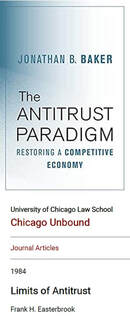 On Saturday the top three teams in the English Premier League were awarded penalties that were reviewed by the available technology (VAR). All three of the top teams won their games by one goal. These were important decisions. As is normal, debates followed about the penalties that were awarded, the ones that might have been awarded, and the time taken by those using VAR to cast an opinion. It is possible to combine these elements into a framework used by economists in competition law (antitrust). The framework seeks to minimise the cost of errors. The total cost of errors is (1) the error of awarding a penalty that should not have been awarded, (2) the error of not awarding a penalty that should have been awarded, and (3) the cost of decision-making system. The introduction of VAR increased the decision-making costs and decreased, but not eliminated, type-1 and type-2 errors (also known as false positives and false negatives). Given the importance of type-1 and type-2 errors then it is hard to argue for the removal of VAR. Improvements in the use of VAR will reduce the costs of the third component. The error cost framework also allows us to consider the presumptions behind the rules we use and how these presumptions shift the burden of proof. In the case of penalties, the spur of the moment decision by the referee is presumed to be correct. There must be a clear and obvious error for the decision of the referee to be overturned. The presumption is closer to the presumption of innocence in criminal cases. The burden of proof is higher than the balance of probabilities one might find in civil cases. Time is important. Compare the way decisions about penalties are made with the way decisions are made about offside. In the latter case, the assistant referee is advised to delay any decision with an element of doubt. The cost of type-1 and type-2 errors is likely to be smaller than in the case of penalty kicks but the system costs are higher due to number of such decisions. Where a goal results then it is reviewable. However, in the case of offside decisions, the technology, and those operating it, are judge & jury. Again, it seems VAR reduces the error costs associated with the decisions. It is important to note that the technology is not error free and its users are not without bias. False positives will remain. Rather than get into a discussion of false positives in the context of technology, let me recommend a visit to the website of the photographer Esther Hovers. Or better still, a visit to the Data Streams exhibition at the Glucksmann, University College Cork. The exhibition incorporates some of Hovers’ work. By John Considine 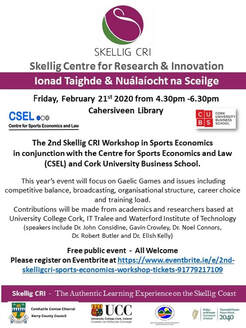 Just as the coronavirus was about to disrupt all our lives, a sports economics workshop took place in Cahersiveen. It was superbly organised and supported by UCC's Adult Education. At the workshop dinner, the discussion turned to the changes in the number of medals awarded to winners of All-Ireland titles. The nub of the debate centred on where to draw the line. In the late 20th century, there were 21 medals awarded by the governing body (GAA). At the time, there was a possibility that 18 players could have played on the day. Fifteen starters and up to three substitutes. Then there were the players that played in preceding rounds. This is where things got messy. There are stories about the destination of the medals being determined by the flip of a coin. This appalled some 21st century sensibilities at the workshop dinner. They wanted to extend the awarding criteria. In response, one participant flippantly suggested that everyone in the victorious county should get a medal. The award of a medal, or other momento, can be more important for those who did not get minutes on the field. Every adult player prefers minutes to medals. It is no contest. Where a player did not get to play then it is important to most of them that their contribution is recognised. Potential substitutes keep starters on their toes. Panel members keep both on their toes. Those outside the panel keep the pressure on panel members. But everyone wants to make a contribution on the biggest day of all. That is the ultimate goal. Minutes on the field. 192. That is the number of different players that played on the day that their team won a senior All-Ireland hurling title in the 21st century. One of these 192 played some minutes in 10 victories. Henry Shefflin stands at the top of the list. The number could have been slightly north of 440. There were 22 titles between 2000 and 2021. For most of the period only 5 substitutes were allowed. Not all teams used five substitutes. This was particularly so in the early days of the 21st century when the number was increased from 3. The main reason the number is less than half of what it could have been is that there are players who played on multiple victorious teams. Henry Shefflin played some minutes in ten wins. He alone reduces the number by 9. A gaggle of other Kilkenny players also played on multiple teams that won the Liam McCarthy cup. Limerick has won three of the last four titles. Ninety-eight played on one victorious team, forty-six on two victorious teams, and twenty-nine on three. After that it is single figures. Who are these 192? There are two named John Power and two named Kieran Murphy. The two Powers are from Kilkenny and the two Murphys are from Cork. Ryan, Maher, and Murphy are the most common family names to have tread on the grass during regulation time. John and Conor are the most popular first names. There is only one Henry. There is only one Shefflin. For the past number of years, the College of Business and Law (one of four colleges) at University College Cork has awarded Researcher of the Year prizes. The categories include Early-Career Researcher, Mid-Career Research and Advanced-Career Researcher.
We are delighted to report regular blog contributors David Butler (Early-Career Researcher) and Robbie Butler (Mid-Career Research) have been awarded this honour for the 2020/21 year. Much of this work is in the area of sports economics and includes some of what is listed below which appeared during 2020 and 2021.
Well done both! |
Archives
June 2024
About
This website was founded in July 2013. Categories
All
|
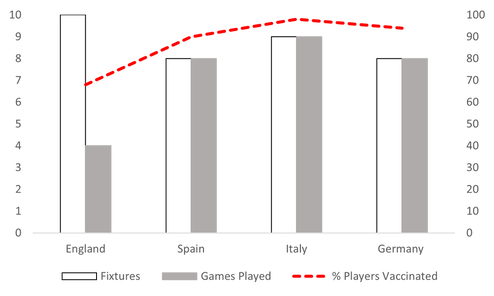
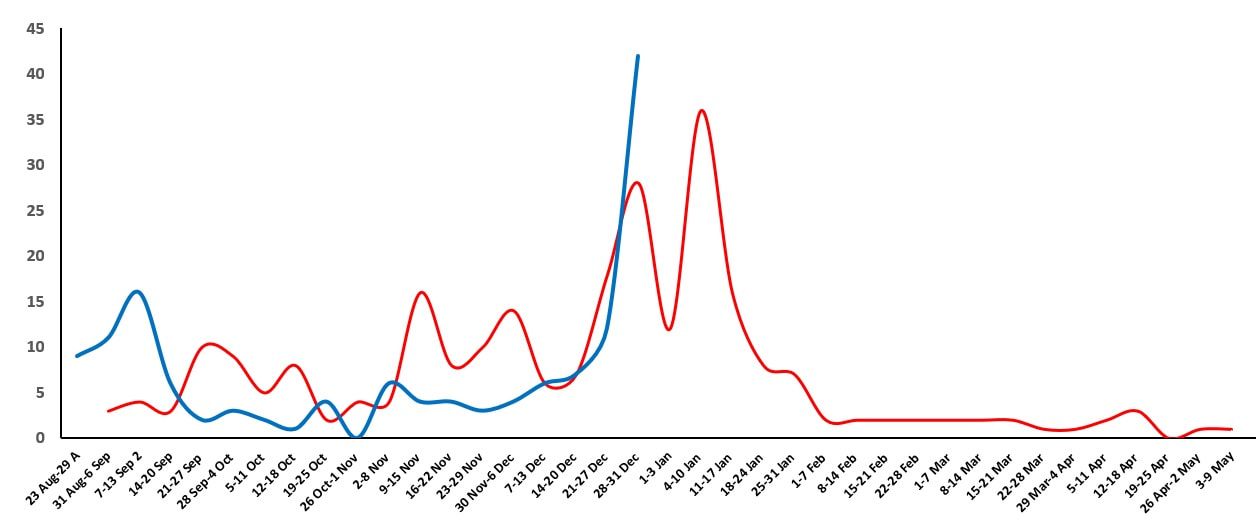
 RSS Feed
RSS Feed